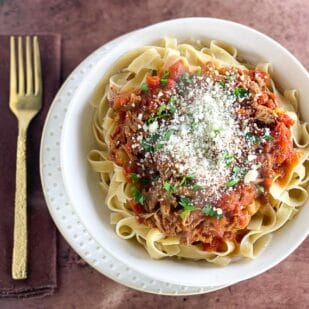
Low FODMAP Instant Pot Pork Ragu
Our Instant Pot Low FODMAP Pork Ragu is easy, flavorful and versatile. The Instant Pot is fantastic at breaking down the collagen in a big hunk of pork shoulder or pork butt. The pork is combined with tomatoes, Italian seasoning and low FODMAP garlic flavor and cooks down to a tender shredded texture that we love with polenta, pasta, mashed potatoes – even rice!
Ingredients:
- 1 ½ tablespoons Low FODMAP Garlic-Infused Oil, made with olive oil
- 3- pound to 3 ½-pound (1.4 kg to 1.6 kg) bone-in or boneless pork butt or shoulder, at room temperature
- 3, 28- ounce (793 g) cans peeled plum tomatoes in purée
- ¾ cup (180 ml) Low FODMAP Chicken Stock or Low FODMAP Beef Stock
- ¾ cup (180 ml) dry red wine
- ¾ cup (48 g) finely chopped scallions, green parts only
- 1 medium trimmed and peeled carrot, finely chopped
- 1 medium trimmed stalk celery, finely, chopped
- 1 teaspoon kosher salt
- 1 teaspoon dried oregano
- 1 teaspoon dried rosemary
- ¾ teaspoon FreeFod Garlic Replacer
- ¾ teaspoon FreeFod Onion Replacer
- ¾ teaspoon freshly ground black pepper
- 3 tablespoons tomato paste
- Fresh flat-leaf parsley
Preparation:
-
Press Instant Pot button for Sauté and set the temperature to Medium/Normal/Custom 300°F (150°C). Set time for 10 minutes. Add the oil and allow it to heat up. Brown the meat in the oil on all sides.
-
Turn off the Sauté function. Add the tomatoes and purée and crush the tomatoes a bit with a potato masher or fork. Add the stock, wine, scallion greens, carrot, celery, salt, oregano, rosemary, FreeFod Garlic Replacer, FreeFod Onion Replacer and black pepper.
-
Lock the lid in place. Set the Instant Pot to Pressure Cook on Maximum for 1 hour with the Keep Warm setting off. Press Start. Allow the pot to cook and then return to normal pressure on its own, which will take about 20 to 30 minutes after the timed cooking period. Unlock the lid. Remove the pork to a large bowl, where you can shred it with two forks.
-
Skim excess fat off of the surface of the sauce and discard. Set machine to Sauté on Medium/Normal/Custom 300°F (150°C) for 20 minutes and press Start. It will come to a simmer. Whisk in the tomato paste. Keep an eye on it, whisking occasionally, and reduce it until it thickens a bit. Re-combine the sauce with the meat, tossing together thoroughly. Taste and adjust seasoning at this time. Your pork is ready to serve. We love it with pasta, mashed potatoes or polenta. Serve a green salad on the side with a sharp vinaigrette.
Notes:
FODMAP Information
Our recipes are based on Monash University and FODMAP Friendly science.
• Canned Tomatoes: Monash University has lab tested canned tomatoes and they are low FODMAP at 92 g or 3.2-ounces, which they say is about 3/5 of a cup. Moderate FODMAPs kick in at about 3/4 cup or 115 g, at which point fructose can become an issue.
• Carrots: Carrots have been lab tested and deemed low FODMAP by both Monash University and FODMAP Friendly. According to Monash carrots contain no FODMAPs.
• Celery: Celery it has been lab tested by both Monash University and FODMAP Friendly. Monash University has lab tested celery and it is low FODMAP in 10 g amounts, which is about a quarter of an average stalk per serving. FODMAP Friendly gives it a “Pass” at 75 g or ¾ cup.
• Pasta: You have to read labels, but there are many low FODMAP gluten-free brands of pasta available. Use what is called for in individual recipes. Our go-to is rice-based pasta. Monash University and FODMAP Friendly have both tested “gluten-free” pasta, but they do not specify what the pasta was made from. Monash says gluten-free pasta is low FODMAP at 145 g or 1 cup cooked; FODMAP Friendly lab testing suggested 2 cups or 146 g cooked is low FODMAP. Monash has also lab tested pasta made from rice, which they list under “rice stick” and it is low FODMAP at 220 g, which no Moderate or High FODMAP amounts given.
• Wine: Red, white and sparkling wine is low FODMAP in 150 ml portions as determined by Monash University and FODMAP Friendly lab testing.
Please always refer to the Monash University & FODMAP Friendly smartphone apps for the most up-to-date lab tested information. As always, your tolerance is what counts; please eat accordingly. The ultimate goal of the low FODMAP diet is to eat as broadly as possible, without triggering symptoms, for the healthiest microbiome.